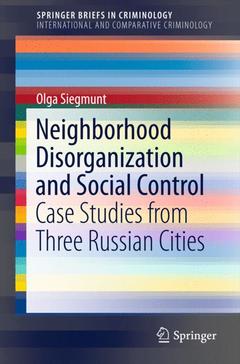Neighborhood Disorganization and Social Control, 1st ed. 2016 Case Studies from Three Russian Cities International and Comparative Criminology Series
Auteur : Siegmunt Olga

This Brief presents a framework for understanding the role of school and neighborhood contexts in the development of self-control. Through the application of Gottfredson and Hirschi?s general theory of crime and Shaw and McKay?s social disorganization theory, the authors of this Brief examine the importance of family socialization and school and neighborhood for self-control of youth in three Russian cities, replicating results from an earlier study in Germany.
The cases presented in the Brief found that family socialization is important for self-control, but it interacts with school and neighbourhood contexts. According to the study, school social control as a structural characteristic can lead to less delinquency, even if students did not develop self-control. Self-control mediates parental supervision and attachment to parents on one hand, and juvenile delinquency on the other hand. However it was not found to mediate neighbourhood context characteristics.
The results of the study provide a research framework that can be applied to other international, comparative contexts. It will be of interest to researchers in Criminology and Criminal Justice, particularly Developmental and Life-Course Criminology, as well as related fields such as Public Policy and Social Work.
Her research interests include crime statistics, survey research, comparative studies, quantitative methods for social research, juvenile delinquency, and victimology. Dr. Siegmunt serves in the editorial board of the journal “Legal Science and Law Enforcement Practice”. She has worked periodically for the first regular German Victim Survey, Victim Survey of Lower Saxony, since its beginning in 2012.
Examines the role of school and neighborhood contexts on self-control
Presents case studies on self-control and social control from three Russian cities
Provides research framework and recommendations for future research
Includes supplementary material: sn.pub/extras
Date de parution : 02-2016
Ouvrage de 82 p.
15.5x23.5 cm



